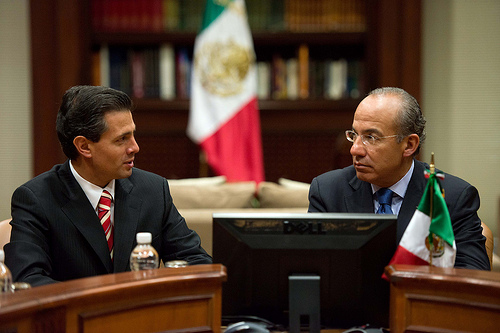Mexico: Debating the Restoration
by Horacio Castellanos Moya / September 13, 2012 / No comments
Does the return of the PRI signal a return to authoritarianism for Mexico?

President Elect Enrique Peña Nieto (left) and his party PRI will be taking power as President Felipe Calderón (right) leaves office. Photo: Gobiernal Federal. Creative Commons.
In recent months a riveting and intense debate has developed in Mexican intellectual circles over whether or not the Institutional Revolutionary Party’s (PRI) return to power on December 1st will lead to a “restoration” of the old authoritarian order.

- Corkscrew is focused on Latin American issues. Literature, journalism and politics are the main concerns of this column. A corkscrew is useful only if it opens a bottle, hopefully full of something that would enlighten our spirits, but we could also set loose a cruel Genie or a rotten wine. The author will follow this principle: look for topics that open debates, new perspectives, and controversy. Cheers!

- Horacio Castellanos Moya is a writer and a journalist from El Salvador. For two decades he worked as a journalist in Mexico, Guatemala, and his own country. He has published ten novels, five short story collections and two books of essays. He was granted residencies in a program supported by the Frankfurt International Book Fair (2004-2006) and at City of Asylum/Pittsburgh (2006-2008). In 2009, he was a guest researcher at the University of Tokyo. Currently he teaches at the University of Iowa.
The PRI governed Mexico from 1929 until 2000, when it lost the presidential election to the conservative National Action Party (PAN). The PRI’s long rule over Mexican society came to be characterized by a number of epithets, including one coined by Nobel laureate Mario Vargas Llosa in September 1990, when he famously referred to the Mexican regime as “the perfect dictatorship.”
The question at the center of the current intellectual debate is whether it’s still possible for the PRI to restore the old order, or if Mexico’s political system and Mexican society have developed their democratic institutions sufficiently enough to thwart a return to authoritarianism in the twelve years since the PRI left power.
The debate is being carried out by columnists for the daily and weekly newspapers, but the most far-reaching and in-depth commentaries have been published by the two leading national monthly magazines, Letras Libres and Nexos.
Positions in the debate range from extremes on both sides. On one side are those who see a bleak political future. They believe the PRI won the elections by fraudulent means (by buying votes), and that it never truly recast itself as a political party with democratic ideals, preferring to spend the years out of power hunkered down and lying in wait for its opportunity to return. They also view the PRI’s local power networks at the state and municipal levels as deeply tied to narcotrafficking and corruption. On the other side are the “optimists,” who believe that even if the PRI had the worst intentions and was in fact plotting a return to authoritarian rule, it would be impossible for it to reverse recent democratic advances in Mexico; not only because of the country’s interdependence with the United States and the rest of the globalized world, but also because the development and complexity of Mexican society would not allow a restoration of things as they were.
One of the most fascinating aspects of the debate is watching the political transvestitism of many Mexican intellectuals who supported the PRI in the closing years of the 1990s, then openly went over to the PAN when it came to power, only to announce their “optimistic support” of the PRI in the days since this year’s elections. This phenomenon must be understood in the context of a society where many intellectuals still play the role of courtesans. As a result, their political behavior will always be to align themselves with the party in power, regardless of ideology, so they can hold on to their positions as bureaucrats, diplomats, or cultural officials. The same thing occurs in more subtle ways in the case of independent magazines, whose bottom lines depend heavily on advertising revenues collected from various government entities.
In any case, the PRI’s return to power will put the democratic maturity of Mexican society, its political institutions, and intellectuals to the test.
Translation: Sam Cogdell




